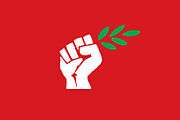March 14 Alliance
March 14 Alliance تحالف ١٤ آذار | |
|---|---|
 | |
| Leader | Saad Hariri |
| General Secretary | Fares Souhaid |
| Founded | 2005 |
| Headquarters | Beirut |
| Ideology |
Lebanese nationalism Anti-Syrian government Nonsectarianism |
| Political position | Big tent |
| Colors | Red, White |
| Seats in the Parliament of Lebanon: |
41 / 128 |
| Website | |
|
14march | |
 |
|---|
| This article is part of a series on the politics and government of Lebanon |
|
The March 14 Alliance (Arabic: تحالف 14 آذار, translit. taḥāluf 14 adhār), named after the date of the Cedar Revolution, is a coalition of political parties and independents in Lebanon formed in 2005 that are united by their anti-Syrian regime stance and their opposition to the March 8 Alliance. It is led by Saad Hariri, second son of Rafic Hariri, as well as other prominent figures.
Parties that left the alliance
The Free Patriotic Movement of General Michel Aoun left the informal grouping before the 2005 general election, before March 14 was an established alliance, due to major disagreements. After the 2005 elections, The Free Patriotic Movement was the sole political opposition, but was joined one year later by the pro-Syrian government March 8 Alliance in November 2006.
The Progressive Socialist Party left the 14 March movement in August 2011.
The National Liberal Party left the 14 March movement the 22 December 2016.
2006 Lebanon War
On the 12th of July 2006, the 2006 Lebanon War between Israel and Hezbollah started. During the war, the 14 of March Coalition took a stance against Hezbollah accusing the armed party of causing the war on Lebanon. However, Hezbollah claimed that Israel preplanned such a war, supposed to be waged on September during the annual rally Hezbollah holds on the International Qods (Jerusalem) Day.
The 14th of March coalition, amidst the war, urged Hezbollah to hand over their weapons, accusing the party of causing the war on Lebanon.
During the first few days of the war, former US Secretary of State Condoleezza Rice visited Beirut and held a meeting with the 14th of March coalition and declared afterwards that a new Middle East will be born after this war, saying: "It's time for a new Middle East". Rice and Fouad Siniora met during her visit to Lebanon.
Claims
The principal political claims of the March 14 Alliance are:
- The exile of the former President Émile Lahoud, reputed an illegitimate president under the Syrian regime in September 2004.
- Institution of a court for a case against the Prime Minister Rafic Hariri's killers.
- Pacification with Syria and review of the Syrian-Lebanese borders.
- Opposition to the Syrian interference in Lebanon.
- Institution of a weapons government monopoly, disarmament of Hezbollah and review control of the Lebanese Armed Forces by the President and general Michel Suleiman and the police by the Prime Minister.
Member parties
See also
External links
- Official website
- Independence party Official Web Site
- Kataeb Party Official website
- National Liberal Party (Lebanon) Official website
- Democratic Left Movement (Lebanon) Official website
- Tajaddod/Democratic Renewal Movement Youth blog